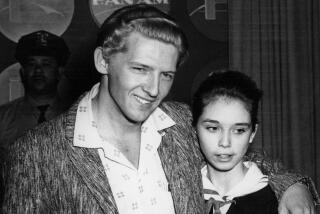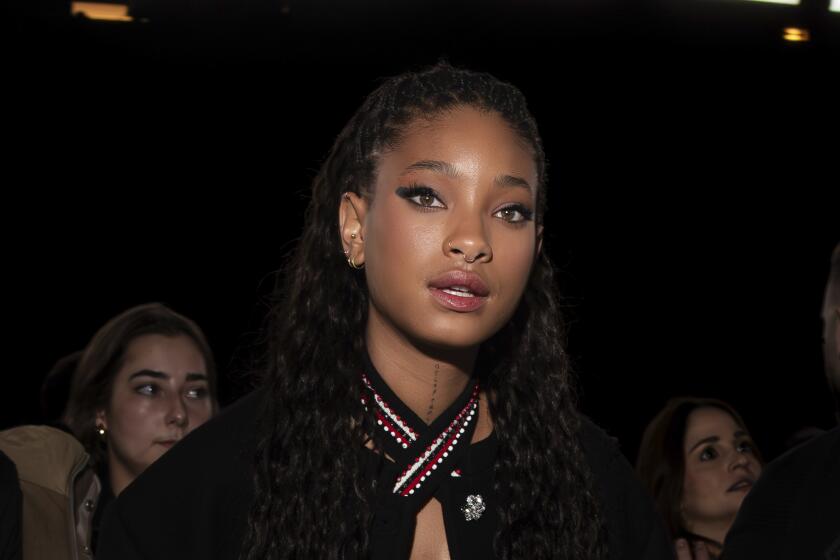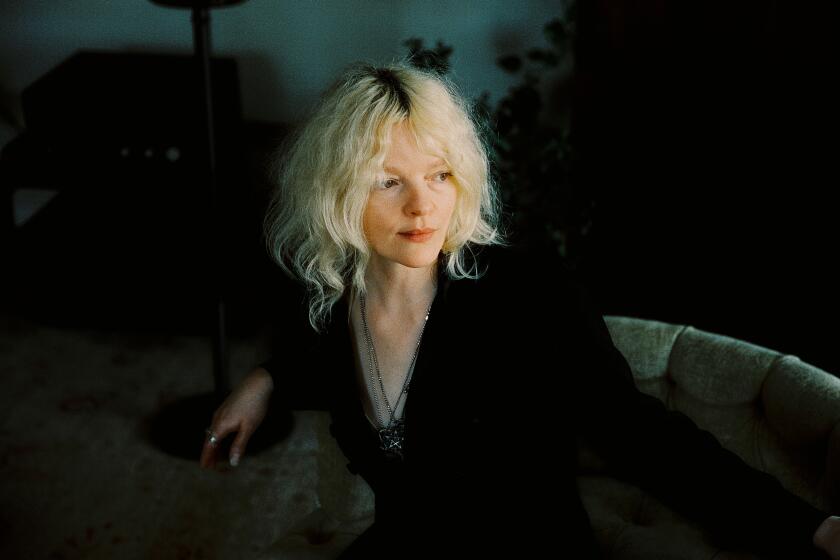Sign Here, Puhleese!
It’s easy to see why Ani DiFranco has record executives drooling. Not only does the 25-year-old singer-songwriter from Buffalo, N.Y., write songs as nakedly personal as Alanis Morissette’s and PJ Harvey’s, but she is also as defiantly independent as Courtney Love.
With her colorful, beaded hairdo and de rigueur tattoos, she looks like the epitome of ‘90s maverick cool. She often dresses in a black leather jacket and pants, and she wears enough decorations in her ears and right nostril to turn even the most forgiving metal detector into a warning siren.
But the thing executives may find the most irresistible about this richly talented artist is that she has spurned all their big-buck contract offers. All seven of her albums have been released on her own Righteous Babe Records.
“Yes, they’ve all come courting at some point or another,” DiFranco says, soaking up some afternoon sun in a Mid-Wilshire park near her motel. “Some of them can’t really conceive of someone who doesn’t have a price. They think I’m just holding out for some magic figure.
“But I’ve just always felt an aversion to business people. These companies are selling records, but they could be selling microchips or oil. To me, one of the purposes of art is to challenge the system, and working within it always seemed like a compromise that I wasn’t comfortable with.”
DiFranco pauses as if replaying her words in her head, then makes a comical grimace.
“Oh, blah, blah, blah,” she says, smiling at her own serious tone.
“Besides,” she adds, with a shrug, “I’m doing just fine on my own, thank you.”
True enough.
DiFranco’s musical approach fits so well with the creative and commercial center of rock in the era of the Angry Young Woman that if you didn’t know her history, you would suspect that she is a master pop strategist.
In “Not a Pretty Girl,” the title track from her 1995 album, she declares:
I ain’t no damsel in distress,
And I don’t need to be rescued . . .
Wouldn’t you prefer a maiden fair?
Isn’t there a kitten,
Stuck up a tree somewhere?
But DiFranco was writing songs with a similar tone for years before she finally started getting glowing reviews and building a live following around the country. She will play the Mayan Theatre on June 2, one of four Southern California shows on a tour to promote her new “Dilate” album, which is due in stores May 21.
If anything, she seems uncomfortable being so close to today’s pop pulse.
“I often run into all the stereotypes that go along with being a woman with an opinion. . . . The idea that if you are fiercely opinionated you are a bitch, right?” she says. “It’s just the year of the angry woman thing. There is an official pigeonhole and everyone is shoved into it now.”
She pauses once more, as if to again lighten the tone.
“Before,” she says finally, with a trace of a smile, “it was my special little world.”
Ignore the facts and tell the truth.
That’s both a line from one of DiFranco’s early songs and her personal songwriting code. She freely mixes and matches slices of observation and autobiography to arrive at what she feels are emotional truths.
Critics frequently refer to her songs as feminist observations, but DiFranco dislikes their being viewed as social manifestoes.
“I don’t have an agenda in my music,” she says. “I’m not trying to talk about women’s liberation or women’s anything in my songs. I’m just talking about this woman’s liberation.
“What I’ve always tried to do was just tell my story. It’s more a personal journey rather than a political statement.”
One of the captivating things about DiFranco’s writing is how much of that journey she shares in her dramatic tales of romantic betrayal and self-affirmation.
In “Done Wrong” on her upcoming album, she writes about a tortured relationship:
How could you do nothing,
And say, “I’m doing my best”?
How could you take almost everything,
And then come back for the rest?
“I used to feel nervous writing certain things,” she says of her style, which combines punk aggression with folk introspection. “I’d finish a song and then go, ‘I can’t sing this in front of people.’ But I eventually realized that our stories aren’t that unique.
“The more I stand on a platform and say this is what I did, this is what happened, this is how I felt, the more people say, ‘Yeah, me too.’ To me, music is a way we affirm each other. At some point you realize you are not a freak of nature. . . . I’m just like everybody else. Somebody might just as well start admitting some of this stuff. Why not me?”
For someone who tells so much about herself in her music, Ani (pronounced AH-nee) DiFranco is defensive when it comes to the specifics of her apparently troubled adolescence in Buffalo.
“My mother and I moved out of the house when I was about 11 or something,” she says hesitantly. “I don’t know. . . . We were both kind of freaking out because my family was not a very happy one. The house when everyone lived together was like one scary scene after another. So it was a good thing we all kind of went our different ways.”
DiFranco was 15 when her mother, an architect, got a job that took her out of the state. Rather than leave Buffalo, the teenager moved into her own apartment and has been on her own since.
Her mood brightens when she talks about how the music she used to hear in local clubs and bars was a comfort to her.
“I never had the rock star dream,” she recalls. “Music was just a way of life for me. I’m talking about people with guitars in bars--unknown people, if you will, open-mike type scenes, lots of alcoholic, barfly types who wrote their own songs. It all seemed very natural, so eventually I started writing too.”
After studying art for a year at a state college, DiFranco moved to New York City in the late ‘80s in hopes of bigger stages and new adventures. She brought along a cassette tape that she had been selling at shows and giving to club owners in hopes of getting more gigs. The tape, titled simply “Ani DiFranco,” eventually became one of her Righteous Babe releases.
While trying to get started in New York, she worked at such jobs as kitchen helper and nude model for art classes. She also attended classes for about a year at the politically charged New School for Social Research, where she was stimulated by intense intellectual confrontations.
Eventually, her music blossomed. She began attracting attention on the local scene and then branched out in other cities. She now estimates she has done more than 1,000 concerts (usually, in recent years, accompanied by drummer Andy Stochansky), and says sales of her seven albums are nearing the 300,000 mark.
Given DiFranco’s sometimes tough exterior, it’s surprising to see her blush when asked about her new album.
“Well, I’ve made an album I never thought I’d make,” she says almost shyly. “I’ve been sort of consumed with a relationship for a year now and the album is all about one subject. It’s about a love affair from all these different angles. . . . The denial, the anger, the rapture, the insecurities.”
She stops, making you think she might feel uncomfortable elaborating on the relationship. But her only reservation is naming the other party. She doesn’t want his life opened up to scrutiny.
“I’ve been in love before, but never like this,” she continues. “I was always just too busy to get involved. I just didn’t have time and it didn’t seem that important to me. But this was real melodrama. The circumstances were very bad, a lot of people got hurt.
“I finally holed myself up in Texas in January and made the album--which was after we broke up. It’s all about resignation and redemption. The last song is a kind of a hymn, the first I have written.”
DiFranco pauses again, as if waiting to deliver a punch line.
“So guess what happens,” she finally says. “He shows up again and we get involved all over again. God, who would ever have figured?”
DiFranco seems amused when asked whether she worried that an album about love would be considered unhip by the alternative-rock crowd that has embraced her.
“I hate the idea of everyone agreeing so-and-so is hip and so-and-so isn’t,” she says sharply. “I think that’s the problem with people. They look at the surface of things. As far as I’m concerned. there are a lot of hip bands that are completely vapid.
“One of the reasons I call myself a folk singer is that folk music is so unhip today. I don’t think the term is literally very accurate. But if folk music is so uncool these days, there must be something good about it. . . . I like to be on the outside.”
*
Ani DiFranco plays on May 30 at the Galaxy Theatre, 3503 S. Harbor Blvd., Santa Ana, 8 p.m. $17.50. (714) 957-0600. Also May 31 at the Ventura Theatre, 26 S. Chestnut Ave., Ventura, 8 p.m. $16.50, (805) 648-1936; June 1 at SOMA, 5305 Metro St., San Diego, (619) 239-7662, June 2 at the Mayan Theatre, 1038 S. Hill St., 8 p.m. $18. (213) 746-4287.
*
Hear Ani DiFranco
* To hear excerpts from the album “Dilate,” call TimesLine at 808-8463 and press *5723.
In 805 area code, call (818) 808-8463.
More to Read
The biggest entertainment stories
Get our big stories about Hollywood, film, television, music, arts, culture and more right in your inbox as soon as they publish.
You may occasionally receive promotional content from the Los Angeles Times.






